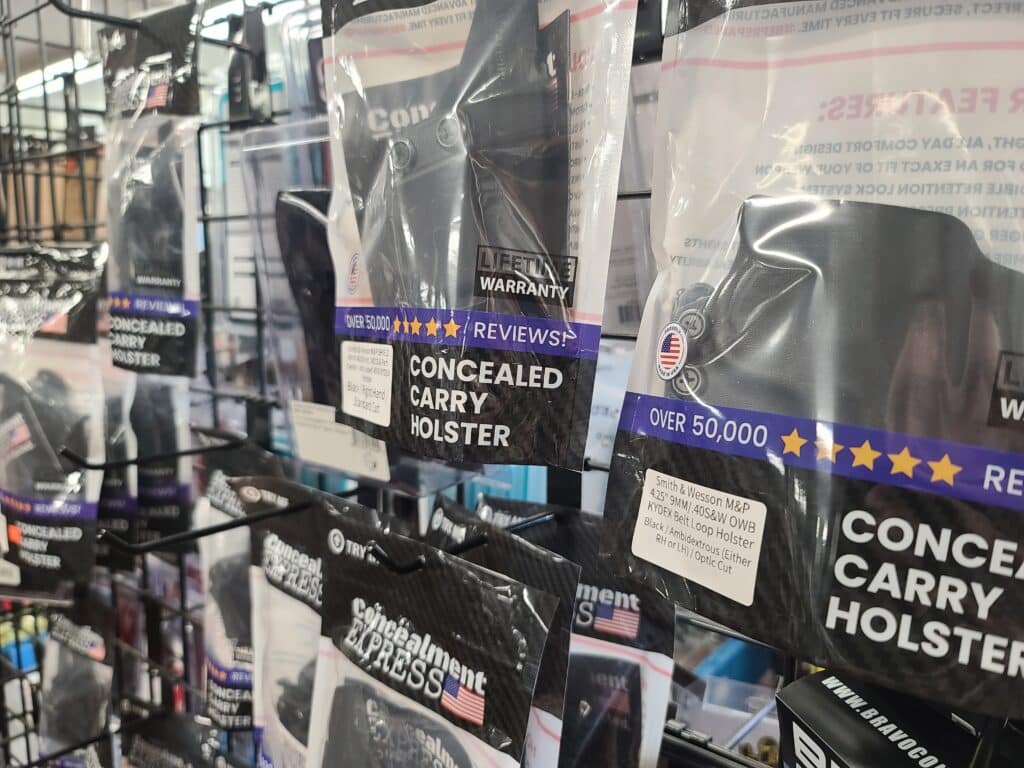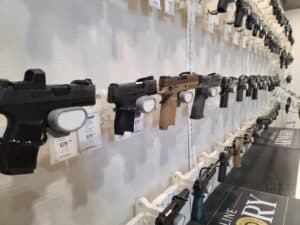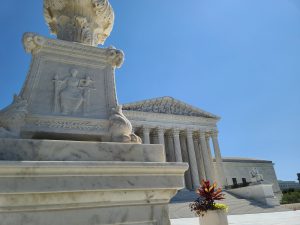A few months ago, it looked as though imposing expansive “sensitive places” restrictions as a response to the Supreme Court’s New York State Rifle and Pistol Association v. Bruen decision was picking up steam–even outside states directly affected by the ruling. Colorado and Washington were considering their own versions of the severely restrictive gun-carry regimes, despite having a long history of issuing and respecting concealed-carry permits.
However, as the end of the legislative season approaches, the picture is starting to look very different. As Contributing Writer Jake Fogleman explains, bills in both states have been greatly pared down as they passed through their Democratically controlled legislative chambers.
Speaking of legislatures controlled by Democrats, I decipher what to make of Virginia’s sending a huge package of aggressive gun bills to Republican Governor Glenn Youngkin’s desk and his subsequent vetoes. Cam Edwards, editor of Bearing Arms and a fellow Virginian, joins the podcast to give his two cents on what that back and forth tells us about not just the state’s gun politics but the nation at large.

Analysis: Shall-Issue States Lose Appetite for Bruen-Response Bills [Member Exclusive]
By Jake Fogleman
Lawmakers in two long-time shall-issue states introduced expansive “sensitive place” restrictions for licensed gun carriers earlier this year. However, their eyes turned out to be bigger than their states’ politics could stomach.
Washington Governor Jay Inslee (D.) signed Senate Bill 5444 into law on Tuesday alongside a package of new gun-control measures. Beginning this June, it will become a misdemeanor offense to “knowingly possess” a firearm in public libraries, zoos, aquariums, and transit facilities. In a twist, however, the new law expressly exempts those with valid concealed carry licenses from this new prohibition. As such, it essentially amounts to an open carry ban in a handful of new locations.
That’s a significant retreat from what lawmakers initially envisioned for the bill. As originally introduced, the measure would have applied to all gun possession, including licensed concealed carry. It also would have applied to any park or recreational facility where children are likely to be present and all state or local public buildings, in addition to the “sensitive places” that did make it into law.
Meanwhile, lawmakers in Colorado watered down their initial proposal even further to advance it.
As initially introduced, Senate Bill 24-131 would have banned licensed gun carry in all parks, playgrounds, rec centers, public demonstrations, polling places, medical facilities, banks, places where alcohol and marijuana are sold for consumption, places of worship unless given express permission, stadiums, amusement parks, aquariums, museums, zoos, government buildings, correctional facilities, libraries, homeless shelters, daycares, and college campuses.
But when push came to shove, and the California-style measure faced its first vote in a narrowly Democratic-controlled committee, the bill’s sponsors opted to pare it down to just the handful of places mentioned by the Supreme Court in the dicta of its Bruen and Heller opinions to get a crucial moderate-leaning Democrat on board. On Wednesday, the bill cleared the Colorado Senate Judiciary Committee—its toughest test on the path to becoming law. Now, it only bans gun carry at polling places, schools and colleges, and government buildings.
The amendment also included a change to the bill’s title, which now stipulates that the gun ban is limited to “sensitive spaces recognized by the United States Supreme Court as places at which longstanding laws prohibited carrying firearms.”
As a result, the first shall-issue states to consider emulating the Bruen-response bills of the half-dozen or so states that had their gun-carry regimes upended by the Supreme Court have significantly backtracked. It will leave New York, New Jersey, Maryland, Hawaii, and California as the only states with such expansive public carry bans on the books.
That’s a setback for gun-control advocates, who had tried to build on the momentum of expanded sensitive place restrictions in the former may-issue states. It also speaks to the tricky politics they will continue to confront in targeting concealed carriers, even in progressive-trending states.
The politics of cracking down on gun carry in a state like New Jersey, where until 2022, state policy essentially banned concealed carry through restrictive may-issue permitting, is a relatively simple matter of continuity in a state where gun-rights advocates hold little sway. Switching to a regime that essentially bans concealed carry through expansive “gun-free” zones is a small practical change. Either mechanism maintains a status quo where practically no one can legally carry a concealed firearm.
Attempting to replicate that system in states with long track records of issuing permits and allowing them to be utilized more broadly is another story. In other words, sizeable Democratic majorities in control of state government may be necessary, but they aren’t sufficient for making the elimination of concealed carry palatable.
None of this is to say that blue states Washington and Colorado will not try again. It’s certainly possible that state lawmakers in favor of more restrictive carry policies will use this year’s modest progress to soften the ground for future restrictions in a piecemeal approach.
But, thus far, the early experiment of progressive-leaning shall-issue states copying the carry policies of their formerly may-issue counterparts has not panned out the way gun-control activists wanted.
Podcast: Youngkin Wipes Out Slate of Virginia Gun-Control Bills (ft. Cam Edwards) [Member Early Access]
By Stephen Gutowski
This week, we’re examining the implications of Virginia Governor Glenn Youngkin (R.) vetoing 30 different gun-control bills.
Joining us to do that is Cam Edwards of Bearing Arms. He has long been one of the top pro-gun analysts out there. He also happens to live in Virginia, like me.
So, he has paid special attention to the fight over guns in Virginia. Not just this year either, but for the last several election cycles. He argued the dynamics at play during this year’s legislative session were pretty surprising.
Not only did we not know what Youngkin would do with the dozens of gun bills that made it to his desk before he formally announced his vetoes, but the way those proposals got through the legislature was surprising too. Every Democrat in the state house held together to vote for every single proposal, even the more aggressive bans and restrictions.
Cam said that was a fascinating development given the large grassroots backlash the party faced after its last attempt to enact sweeping gun reforms in 2020. He also argued the dynamic that has developed in the state’s gun politics should be very concerning for gun-rights advocates.
Plus, Contributing Writer Jake Fogleman and I discuss President Biden’s approval on guns falling below 30 percent.
You can listen to the show on your favorite podcasting app or by clicking here. Video of the show is available on our YouTube channel. An auto-generated transcript is available here. Reload Members get access on Sunday, as always. Everyone else can listen on Monday.
We are planning to shake up the podcast a bit in the near future, by the way. We’re going to split the news update section into its own podcast that premiers on Fridays. The interview section will remain the same, including early access and the opportunity to appear on the show for Reload Members. This should let us get the more time-sensitive part of the podcast out quicker for you guys.
Let us know if you have any thoughts about that plan!

Analysis: Virginia’s Gun Politics Mirror America’s Polarization [Member Analysis]
By Stephen Gutowski
This week, Virginia Governor Glenn Youngkin (R.) sided with his party and vetoed a slew of gun-control bills. That came after those bills made it to his desk from the Democratically-controlled legislature on strict party-line votes. The purple state’s back-and-forth fight over gun policy encapsulates that of the nation at large.
On Tuesday, Youngkin rejected 30 different gun bills. The move cemented Virginia’s gun laws in nearly the same place they were before the legislative session began. Youngkin argued Virginia already “has some of the strictest gun laws in the country,” and the proposals would “affect law-abiding citizens” by “violating our constitutional rights.”
Virginia Democrats trashed his decision. House Majority Leader Charniele Herring (D.) said she is “ashamed of the Governor’s vetoes.” House Democratic Caucus Chair Kathy Tran said they “threaten the safety and prosperity of our communities across the commonwealth.”
“MAGA Republicans have refused to act and protect our children, and Virginians will hold them accountable in November,” House Speaker Don Scott (D.) said in a statement.
Youngkin’s vetoes were a bit uncertain at points. He hadn’t run on gun rights. Democrats tried to use the gun bills as a bargaining chip for his vaunted stadium project. Outside of arguing Virginia already had strong gun laws during his State of the State address, he didn’t telegraph what he would do with the bill package.
But what was more surprising than Youngkin’s decision to block nearly all of the gun legislation that made it to his desk was the volume and aggressive nature of the bills that made it that far. And how they got there.
The package of gun bills included bans on popular firearms, like the AR-15, and a bunch of restrictions on gun buying and carrying. Most of them also faced uniform opposition from Republicans. But they received universal support from Democrats.
Not a single one of the bills lost a single Democratic vote. The party managed to get 30 of them through both houses of the legislature despite controlling each by just a single seat. That’s a remarkable level of cohesion around even the most controversial gun restrictions for a party in a purple state where they just managed to recapture the House and only by the thinnest margin.
It also comes just four years after the state saw one of the largest grassroots protests against gun restrictions in history. In 2020, when Democrats held control of the legislature and the governor’s mansion, they pursued a package of gun restrictions that also included an AR-15 ban (and even confiscation). In response, the vast majority of Virginia counties declared themselves “Second Amendment sanctuaries,” and tens of thousands of people showed up in Richmond to protest the bills.
That culminated in Senate Democrats killing the AR-15 ban. Youngkin won the gubernatorial race the following year, and Republicans recaptured the House.
But Democrats won back the House and held the Senate in last year’s election. This legislative fight shows the party has only become more committed to passing new gun restrictions.
The lack of Republican support for 30 of the bills Democrats produced and Yougnkin’s vetoes indicate Virginians aren’t moving to the left on the issue. Or, at the very least, there isn’t agreement on that point.
So, what all of this tells us is that Virginia Democrats and Republicans are moving further away from each other on gun policy. And that makes a lot of sense when you look around the rest of the country.
Red states and blue states have been diverging for a long time now. Republicans have eliminated gun carry permit requirements almost everywhere they hold the levers of state power. Democrats have begun expanding gun-free zones to make gun carry nearly impossible where they have control, even in the wake of a Supreme Court rebuke (or, really, because of it). No red state has an AR-15 ban, while that policy has seen a resurgence in blue states of late.
Very few new gun policies have garnered cross-over appeal in the past decade or two. “Red Flag” laws saw some success in breaking out beyond the deepest blue states and into red or purple ones, including Virginia. But opposition to those policies has begun to calcify too, with Tennessee rejecting a proposal last year and Wyoming becoming the second state to make such orders illegal (potentially foreshadowing the next red state gun policy trend).
Republican-controlled and Democrat-controlled states are at near total odds with one another on gun policy now. Virginia shows that divide is extending to purple states, too.
But Virginia does offer a few caveats to that conclusion. For one, while protests helped prevent the AR-15 ban from passing in 2020, Virginia Democrats did manage to impose some less sweeping and more widely supported gun laws, including the aforementioned Red Flag law and a universal background check scheme. So, there are fewer reforms Democrats can push for before getting into more sweeping and less broadly popular policies.
Additionally, opposition parties tend to be more willing to vote for controversial policies they don’t think will become law. It’s easier to vote for a bill to send a message than for a bill that will have a real-world impact on your constituents—especially when you know at least some of them won’t like that impact. So, maybe some of the Democrats who supported this package of gun restrictions wouldn’t have done the same if they were sure the governor would sign it.
Youngkin also signed one bill with some of the hallmarks of a traditional bipartisan effort. In the wake of an elementary school child using his mother’s gun to shoot a teacher last year, the legislature got significant cross-over support to pass a bill that makes it a felony to give a minor access to a firearm–but only if there’s evidence they are a threat to themselves or others. That law addresses a specific issue that happened in the state but in a more targeted way that’s unlikely to affect many lawful gun owners.
Still, the back-and-forth in Richmond indicates the parties have become even more entrenched on guns than they already were.
That’s it for now.
I’ll talk to you all again soon.
Thanks,
Stephen Gutowski
Founder
The Reload







